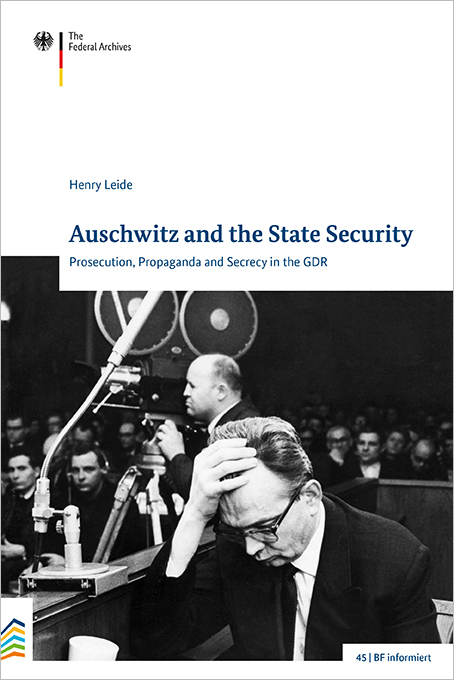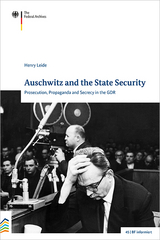Auschwitz and the State Security
Prosecution, Propaganda and Secrecy in the GDR
Seiten
2022
Bundesarchiv/Stasi-Unterlagen-Archiv (Verlag)
978-3-946572-31-2 (ISBN)
Bundesarchiv/Stasi-Unterlagen-Archiv (Verlag)
978-3-946572-31-2 (ISBN)
- Titel nicht im Sortiment
- Artikel merken
Auschwitz extermination camp stands for the industrially organised mass murder of European Jews, a heavy burden for the two post-war German states. The GDR leadership attempted to place historical responsibility for this solely on the shoulders of the Federal Republic and preferred to focus on West German failures to punish these crimes in its propaganda. However, the criminal prosecution on its own territory did not do justice either to the sheer scale of the crimes or the expectations of the survivors.
This study looks at the GDR’s handling of “its” Auschwitz cases, especially ist contradictory criminal prosecution practices. In the early stages of the GDR there was a strong desire for punishment but, at the same time, an arbitrary and largely ineffectual search for the truth. Draconian punishments, even in cases of dubious criminal culpability, went hand in hand with a failure to prosecute very serious crimes.
Later, the punishment of Nazi crimes within its borders was considered to be largely done and dusted. Any perpetrator unmasked in the GDR could have led to a loss of credibility. Consequently, the State Security kept relevant information under lock and key. If a case could not be hushed up, for instance that of Auschwitz physician Horst Fischer in 1966, the reaction was swift and harsh in order to demonstrate the GDR’s superior desire for punishment. But in other cases, the involvement of East Germans in National Socialist crimes was swept under the carpet by the secret police. Consequently, even individuals who had taken part in the genocide committed in Auschwitz extermination camp got off scot-free in the GDR.
This study looks at the GDR’s handling of “its” Auschwitz cases, especially ist contradictory criminal prosecution practices. In the early stages of the GDR there was a strong desire for punishment but, at the same time, an arbitrary and largely ineffectual search for the truth. Draconian punishments, even in cases of dubious criminal culpability, went hand in hand with a failure to prosecute very serious crimes.
Later, the punishment of Nazi crimes within its borders was considered to be largely done and dusted. Any perpetrator unmasked in the GDR could have led to a loss of credibility. Consequently, the State Security kept relevant information under lock and key. If a case could not be hushed up, for instance that of Auschwitz physician Horst Fischer in 1966, the reaction was swift and harsh in order to demonstrate the GDR’s superior desire for punishment. But in other cases, the involvement of East Germans in National Socialist crimes was swept under the carpet by the secret police. Consequently, even individuals who had taken part in the genocide committed in Auschwitz extermination camp got off scot-free in the GDR.
| Erscheinungsdatum | 29.07.2022 |
|---|---|
| Reihe/Serie | BF informiert ; 45 |
| Zusatzinfo | Faksimiles |
| Verlagsort | Berlin |
| Sprache | englisch |
| Maße | 160 x 240 mm |
| Einbandart | Englisch Broschur |
| Themenwelt | Geschichte ► Allgemeine Geschichte ► Zeitgeschichte |
| Schlagworte | Auschwitz • Auschwitz-Prozess • DDR • Geheimdienst • hauptamtliche Mitarbeiter • Inoffizielle Mitarbeiter • Konzentrationslager • Mengele • MfS • Ministerium für Staatssicherheit • Nationalsozialismus • NS-Verbrechen • Spionage • Staatssicherheit • Stasi • Vernichtungslager |
| ISBN-10 | 3-946572-31-6 / 3946572316 |
| ISBN-13 | 978-3-946572-31-2 / 9783946572312 |
| Zustand | Neuware |
| Haben Sie eine Frage zum Produkt? |
Mehr entdecken
aus dem Bereich
aus dem Bereich
Gewalt, Umwelt, Identität, Methode
Buch | Softcover (2024)
Spector Books OHG (Verlag)
CHF 49,95
wie Freud im Kollektiv verschwand
Buch | Hardcover (2024)
Klett-Cotta (Verlag)
CHF 34,95




